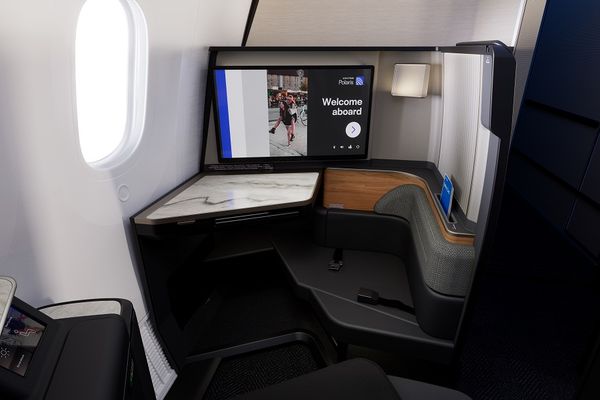The UK's Secretary of State for Transport Mark Harper is currently in the US to discuss a bilateral partnership on sustainable aviation fuel (SAF) at the SAF Investment Summit in Detroit.
Harper is expected to meet US Secretary of Transportation Pete Buttigieg, Canada's Minister of Transport Omar Alghabra, and Singapore's Minister for Transport S. Iswaran at the summit. Harper and Buttigieg will discuss how their respective countries can collaborate on reducing aviation emissions and increasing SAF production. Their goal is to help combat the climate crisis while benefiting the economy through the development of a new industry.

Harper said, "While an ocean separates, we've never been more aligned with the USA on the future of aviation and what that entails - whether it's boosting jobs, opening new trade opportunities or delivering guilt-free air travel. This trip is a crucial part of our work to reduce emissions from aviation alongside the USA, Canada, and Singapore, and I look forward to meeting my counterparts and industry representatives."
The summit will feature representatives from some of the largest companies in the aviation industry, including Boeing, United Airlines, and the International Air Transport Association (IATA). Companies from the financial services and energy sectors will additionally attend the summit.

All of the attendees are looking to increase their supplies of SAF to help the aviation industry meet its target of net zero carbon emissions by 2050. The goal of the summit is to facilitate discussion on the barriers currently facing SAF, ranging from investment to the sourcing of materials.
SAF can play a role in decarbonizing aviation since it comes from a variety of sustainable feedstocks. These feedstocks include cooking oil, green hydrogen, and carbon that is captured from the air. SAF can reduce carbon emissions by up to 80% compared to traditional jet fuel.
Since airlines spend billions on fuel annually, incorporating SAF into future investment plans is of utmost importance to companies. The UK aims to work with international partners to meet its goal of producing at least 10% of jet fuel from renewable sources by 2030.

In July 2022, the UK launched the Jet Zero Strategy; a blueprint on how the country can achieve net zero emissions in the aviation industry by 2050. The plan calls for SAF to comprise 10% of aviation fuel by 2030 and for domestic aviation to be net zero by 2040.
The UK has additionally created a £165 million Advanced Fuel Fund that provides funding to companies involved in SAF production. Five companies have already received funding for their projects.
The SAF industry is predicted to create up to 60,000 jobs and contribute around £10 billion to the UK economy in the future. In addition to SAF plants under development, airlines such as Virgin Atlantic have announced their own plans to decarbonize through testing SAF-powered flights. Through international cooperation, SAF is expected to have an even brighter future in the UK.
Nearly 500 Flights Cancelled Following Venezuela Attack, Caribbean Airspace Closure » EasyJet Airbus A320 Emergency Landing at Lamezia Terme » FAA Finalises AD to Resolve A350 Flight-Control Hazard »
Comments (0)
Add Your Comment
SHARE
TAGS
NEWS UK US United Kingdom United States SAF Sustainable AviationRECENTLY PUBLISHED
 This Week in Aviation: The 10 Stories That Mattered Most
From major airline developments to aircraft updates and industry shifts, this weekly recap highlights the ten most-read aviation stories from the week of December 28.
INFORMATIONAL
READ MORE »
This Week in Aviation: The 10 Stories That Mattered Most
From major airline developments to aircraft updates and industry shifts, this weekly recap highlights the ten most-read aviation stories from the week of December 28.
INFORMATIONAL
READ MORE »
 Nearly 500 Flights Cancelled Following Venezuela Attack, Caribbean Airspace Closure
Hundreds of flights have been cancelled this morning after an overnight U.S. military attack in Venezuela left airspace in much of the Caribbean closed.
NEWS
READ MORE »
Nearly 500 Flights Cancelled Following Venezuela Attack, Caribbean Airspace Closure
Hundreds of flights have been cancelled this morning after an overnight U.S. military attack in Venezuela left airspace in much of the Caribbean closed.
NEWS
READ MORE »
 Why Airline Class Wars Will Intensify in 2026
The "Class War" of 2026 is no longer just about legroom; it is a calculated, multi-billion-dollar strategic pivot by Original Equipment Manufacturers (OEMs) and carriers to capture a "splurge-ready" traveller base that is increasingly opting for "one big trip" over frequent, low-cost hops.
INFORMATIONAL
READ MORE »
Why Airline Class Wars Will Intensify in 2026
The "Class War" of 2026 is no longer just about legroom; it is a calculated, multi-billion-dollar strategic pivot by Original Equipment Manufacturers (OEMs) and carriers to capture a "splurge-ready" traveller base that is increasingly opting for "one big trip" over frequent, low-cost hops.
INFORMATIONAL
READ MORE »



